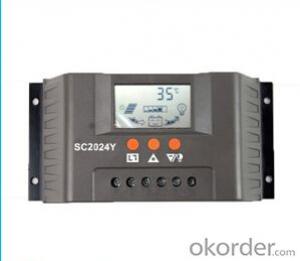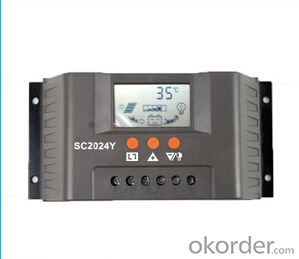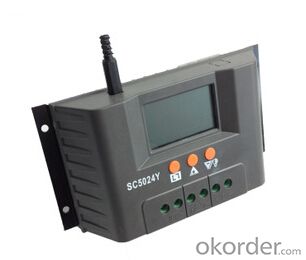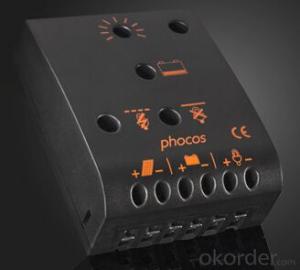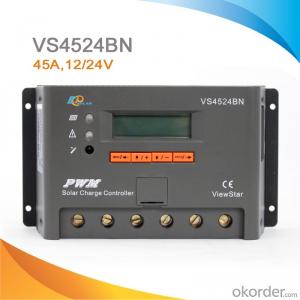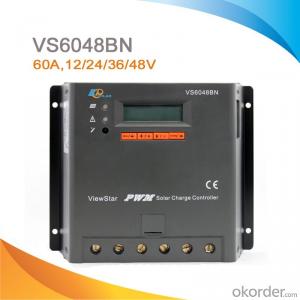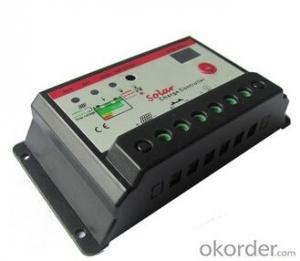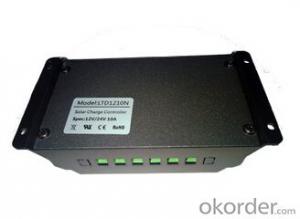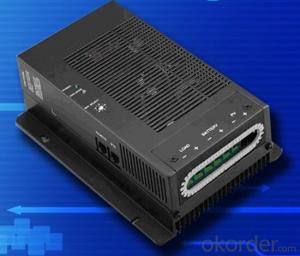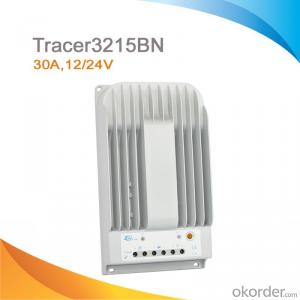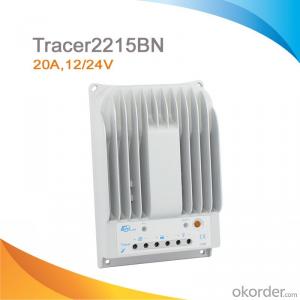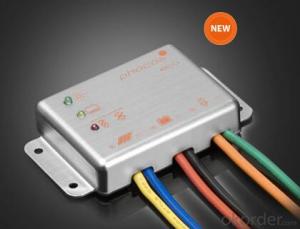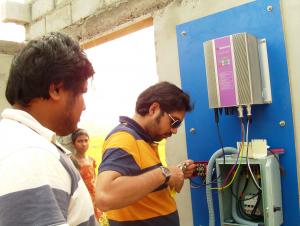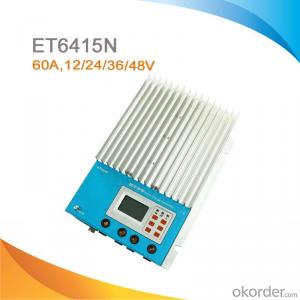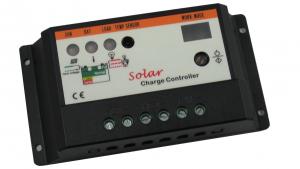12 Volt Solar Charge Controllers bygd intelligent solar controller model sc2024y
- Loading Port:
- Shanghai
- Payment Terms:
- TT OR LC
- Min Order Qty:
- 5 unit
- Supply Capability:
- 50 unit/month
OKorder Service Pledge
OKorder Financial Service
You Might Also Like
Specifications
Main characteristic: 20A PWM 12/24v solar panel charger,solar charge controller with LED
Specification:
Rated Voltage :12V/24V
Rated Load Current :<40a
Over Charge Current :13.7V
Over Discharge Current :10.5-11V
Light control: yes
Temperature control: yes
Time control: yes
Our solar controllers are designed for solar home system, ideal for rural electrification systems,and many advantages compared to other controllers:
Low Cost---
Solar controller has specifically designed to meet the needs of the rural electrification market. The low cost resulted from using the latest electronic technology and high volume manufacturing.
High Reliability--
We are manufacturer of solar charge controllers,power inverters,and solar power systems. All our products are designed for high quality and high reliability. The controller has a low failure rate and will last a long time, and got very good feedback from customers until now.
Electronic protections--
The solar controllers are built-in electronic fused that do not require replacements.
Tropicalization--
The solar controlers electronics are protected with moisture-tight coating, minimizing damage from humidity and from nesting insects.
Easy to use--
Solar controller is fully automatic and requires no adjustments or user selections.
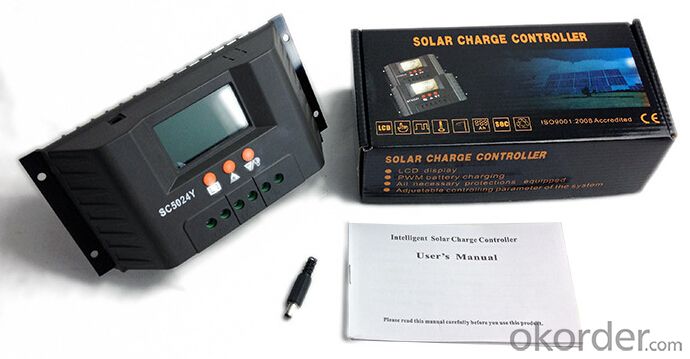
- Q: What is the maximum charging voltage of a solar controller?
- The maximum charging voltage of a solar controller typically depends on the specific model and its design specifications. However, in general, most solar controllers have a maximum charging voltage of around 14.4 to 14.8 volts for a 12-volt system and around 28.8 to 29.6 volts for a 24-volt system. These maximum charging voltages are set to ensure that the batteries connected to the solar controller are not overcharged, which can lead to damage or reduced battery lifespan. It is important to consult the manufacturer's documentation or specifications for the specific solar controller being used to determine the exact maximum charging voltage.
- Q: Can a solar controller be used in a standalone solar power system?
- Yes, a solar controller can be used in a standalone solar power system. A solar controller regulates the voltage and current from the solar panels to the batteries, ensuring optimal charging and preventing overcharging. In a standalone solar power system, where there is no connection to the grid, a solar controller is essential to manage the flow of energy and protect the batteries.
- Q: How does a solar controller handle voltage fluctuations in the battery?
- The purpose of a solar controller is to regulate and control the charging process, ensuring that voltage fluctuations in the battery are managed effectively. When the solar panels generate electricity, the controller carefully monitors the voltage and current output to verify that it falls within the acceptable range for charging the battery. In cases where the voltage from the solar panels exceeds that of the battery, the controller will adjust the charging current to prevent overcharging and potential harm to the battery. This adjustment is made possible by utilizing a charge regulation algorithm. On the other hand, if the voltage from the solar panels is lower than that of the battery, the controller will increase the charging current to compensate for the reduced input voltage. This adjustment guarantees that the battery receives adequate charging power to reach its optimal voltage level. Furthermore, a solar controller may incorporate a built-in voltage regulator to ensure a stable and consistent output voltage for the battery. This regulator effectively smoothens any fluctuations in the voltage output of the solar panels, resulting in a more reliable and consistent charging current for the battery. In conclusion, the solar controller plays a crucial role in managing voltage fluctuations in the battery. It accomplishes this by regulating the charging process, preventing overcharging or undercharging, and ensuring that the battery receives the appropriate voltage and current for efficient and safe charging.
- Q: What is the purpose of the equalization mode on a solar controller?
- The purpose of utilizing the equalization mode on a solar controller is to effectively uphold the well-being and functionality of the batteries connected to the solar system. Typically, this mode is employed for flooded lead-acid batteries, which are commonly utilized in off-grid solar systems. Over a period of time, chemical reactions taking place inside the batteries can lead to an uneven distribution of the electrolyte and the formation of sulfation. Sulfation refers to the accumulation of lead sulfate crystals on the battery plates. These issues have the potential to diminish the battery's capacity and overall performance. The equalization mode incorporated into a solar controller is ingeniously designed to counteract these problems by deliberately applying a controlled overcharge to the batteries. This intentional overcharge assists in redistributing the electrolyte and disintegrating the lead sulfate crystals, ultimately enhancing the battery's performance and prolonging its lifespan. During the equalization mode, the solar controller heightens the charging voltage to approximately 15 volts for a specific duration, generally a few hours. This elevated voltage and extended charging period enable the batteries to attain a state of complete charge and undergo the necessary chemical reactions to renew their capacity. It is crucial to bear in mind that not all solar controllers possess an equalization mode, and it should only be employed with batteries that are recommended for equalization. It is also of utmost importance to meticulously adhere to the manufacturer's guidelines and safety precautions when utilizing this mode. In conclusion, the equalization mode found on a solar controller is employed to effectively preserve the condition and operation of flooded lead-acid batteries by redistributing the electrolyte and disintegrating lead sulfate crystals. This process has the potential to enhance the battery's capacity, prolong its lifespan, and guarantee the optimal performance of the solar system.
- Q: Can a solar controller be used with different types of solar tracking systems?
- Yes, a solar controller can be used with different types of solar tracking systems. A solar controller is responsible for managing the charge and discharge of batteries in a solar power system, as well as regulating the power flow between the solar panels and the batteries. It ensures that the solar panels are operating at their optimal efficiency and the batteries are being charged correctly. Solar tracking systems are designed to orient solar panels towards the sun, maximizing their exposure and energy generation. There are different types of solar tracking systems, such as single-axis and dual-axis trackers, which vary in their ability to track the sun's movement. A solar controller can be integrated with any type of solar tracking system as long as it is compatible with the system's specifications and requirements. It needs to be able to communicate and receive input from the tracking system to adjust the solar panel's orientation accordingly. Additionally, the solar controller should have the capability to handle the increased power output and fluctuations that may occur due to the movement of the solar panels. By using a solar controller with a tracking system, the overall efficiency and performance of the solar power system can be enhanced. The controller ensures that the batteries are being charged properly, preventing overcharging or undercharging, while also optimizing the power flow between the solar panels and the batteries.
- Q: Can a solar controller be used with solar panels that are connected to a micro-inverter?
- Yes, a solar controller can be used with solar panels that are connected to a micro-inverter. The solar controller regulates the charging and discharging of the batteries, while the micro-inverter converts the DC power produced by the solar panels into AC power for use in the home or to be fed back into the electrical grid.
- Q: Can a solar controller be used with a solar-powered emergency backup system?
- Yes, a solar controller can be used with a solar-powered emergency backup system. A solar controller helps regulate the charging of batteries in the system, ensuring optimal performance and preventing overcharging. It is an essential component for efficiently harnessing and storing solar energy in emergency backup systems.
- Q: Can a solar controller be used with solar battery storage systems?
- Yes, a solar controller can be used with solar battery storage systems. A solar controller, also known as a charge controller, is designed to regulate the amount of charge going into the batteries to prevent overcharging and extend their lifespan. It ensures that the solar panels are charging the batteries efficiently and effectively. Therefore, when using a solar battery storage system, a solar controller is an essential component to ensure the proper charging and maintenance of the batteries.
- Q: How does a solar controller handle temperature compensation for batteries?
- A solar controller handles temperature compensation for batteries by adjusting the charging voltage based on the temperature of the batteries. This helps to optimize the charging process and protect the batteries from damage caused by overcharging or undercharging.
- Q: Can a solar controller be used with solar-powered gate openers?
- Solar-powered gate openers can utilize a solar controller, which plays a crucial role in optimizing and regulating battery charging from solar panels. Solar controllers are essential components in any solar power system, as they effectively manage electricity flow from the panels to the battery. By doing so, they ensure efficient battery charging and prevent overcharging and over-discharging, thus prolonging the battery's lifespan. Therefore, it is highly advisable to incorporate a solar controller into a solar-powered gate opener system to guarantee its proper operation and long-term functionality.
Send your message to us
12 Volt Solar Charge Controllers bygd intelligent solar controller model sc2024y
- Loading Port:
- Shanghai
- Payment Terms:
- TT OR LC
- Min Order Qty:
- 5 unit
- Supply Capability:
- 50 unit/month
OKorder Service Pledge
OKorder Financial Service
Similar products
Hot products
Hot Searches
Related keywords
